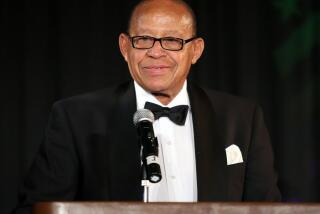Official led federal anti-smoking fight
- Share via
William H. Stewart, who as U.S. surgeon general from 1965 to 1969 led the federal anti-smoking crusade, called for warning labels on cigarette advertising and used the introduction of Medicare to desegregate hospitals throughout the country, died April 23 of kidney failure at Ochsner Medical Center in New Orleans. He was 86.
Stewart was a career Public Health Service officer who became surgeon general one year after his predecessor, Luther L. Terry, released a landmark report that drew an explicit link between smoking and lung cancer and other diseases.
Expanding on the 1964 report, Stewart commissioned studies that criticized the tobacco industry by spelling out the toll that cigarettes exacted in lost productivity, disease and early death. Many of his recommendations, including stricter warning labels on cigarette packages and advertising, were adopted despite fierce opposition.
Stewart, who was a pediatrician and epidemiologist, did more than speak out against smoking. Like few surgeons general before or since, he became a medical activist. He called for an end to racial discrimination in healthcare and advocated expanded medical services for the poor. In a 1967 speech, he criticized “the tight little world of medicine” and its “glass curtain,” which often denied healthcare to those who needed it most.
“On one side of the curtain is the gleaming, antiseptic world of medical excellence,” he said. “Its wonders are plainly visible to those outside. But admission is by ticket only, and the line to the box office stretches out of sight.”
After President Lyndon B. Johnson signed Medicare and Medicaid into law in 1965, Stewart used the programs to compel Southern hospitals to desegregate.
At first, some hospitals adopted ruses to give the appearance that they were offering integrated services. But by tying Medicare funding to the Civil Rights Act of 1964, which prohibited racial discrimination in any federally assisted program, Stewart threatened to withhold money until the hospitals banned discrimination in admissions and treatment.
“Medicare had the effect of desegregating thousands of hospital beds in the South,” he said.
William Huffman Stewart was born May 19, 1921, in Minneapolis. He studied at the University of Minnesota until his father, a pediatrician, became chairman of the pediatrics department at Louisiana State University and the family moved to Baton Rouge.
Stewart graduated from LSU in 1942 and received his medical degree in an accelerated wartime program in 1945. He was an Army doctor for three years before serving his pediatrics residency in New Orleans.
He was called back into the military during the Korean War but transferred to the Public Health Service in 1951, developing a specialty in epidemiology. He moved to Washington in 1954 and worked with the National Heart Institute before leading the Public Health Service’s applied research unit, where he became an authority on national health insurance, which was considered a distinct legislative possibility in the early 1960s.
As surgeon general, Stewart led many initiatives that helped define public health for a generation, including campaigns against childhood measles and arthritis. He called attention to the health effects of air pollution and the psychological effects of violent TV shows.
In 1967, he launched a project to immunize more than 100 million people in Africa against smallpox and measles.
Mostly, though, he was an outspoken opponent of smoking. He fought to toughen the Federal Cigarette Labeling and Advertising Act of 1965, which affixed a warning on cigarette packages saying that smoking could be “hazardous to your health.”
He maintained that it was indefensible for the tobacco industry to advertise cigarettes “in a context of happiness, vigor, success and well-being without even a hint appearing anywhere that the product may also lead to disease and death.”
More to Read
Sign up for Essential California
The most important California stories and recommendations in your inbox every morning.
You may occasionally receive promotional content from the Los Angeles Times.













